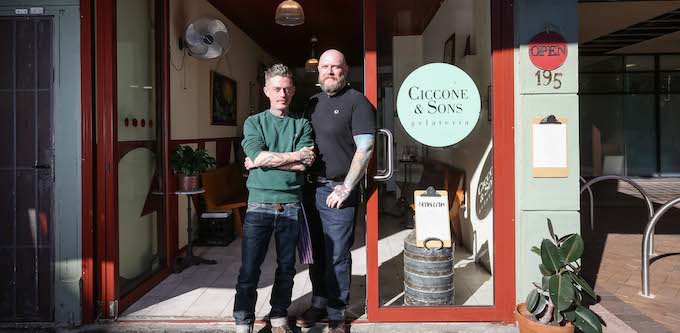
Source: Supplied
Life’s been pretty sweet for gelato business Ciccone & Sons since it moved into Redfern last year. The founders had just returned to Australia from a massive gelati trade fair in Italy, showcasing the strategy behind everything from flavours to cones, when they came across a space for rent that had a City of Sydney business improvement grant already approved.
Like many shopfronts in Regent Street, the building had an old roller door at the front and had experienced many previous lives.
“When we took down the door one of the first things we saw was a sign from about the 80s for ‘Harry’s Furniture’,” says co-founder Sean O’Brien.
Ciccone & Sons had pre-approval for a matched grant of $10,000 and they set about using the grant to bring the building in line with their vision of an all-weather gelato shop.
When it comes to small business grants, there’s no shortage of opportunities, from funding to cover capital works to public art. Getting the cash is just the first step, though: here are four things to help you make the most of the application – and the money.
1. Understand the end goal
From the very beginning of the application process, governments or councils will want to see a tangible result for use of the funds, so be as specific as possible in about why a project is important. Reverse engineer and find grants to match a project via the search engine on the Department of Industry, Science and Innovation’s website.
Having the end game in mind is also important for using the funds effectively, and reporting back to the funding body, as is required in most cases. Grants delivered by the City of Sydney, for example, require grantees to “submit detailed financial reports” about their projects and give feedback on the process at completion.
For Ciccone & Sons, O’Brien learned quickly that the business had to prioritise the works they wanted to undertake on the store.
“We had limited funds to start with, before we even took up the tenancy,” he says.
“The good thing was that made us think economically about what it was important to do. For us the changes we made were designed to build something with flexibility, because we don’t know how the business is going to grow.”
The grant funds went towards simple, actionable priorities: removing the very old roller door front (which wasn’t great for cold nights because it let icy weather in), raising the opening of the shop front and installing glass doors that could be partially or fully opened.

Source: Supplied
2. You’ll have to work with others
“[The shop] owner made the grant application directly, so we ended acting on her behalf to do things like supervise the builder while they actually made the changes,” says O’Brien.
The process involved the business, the landlord and the local council negotiating in order to get works completed.
“For this shop, a full development process was needed to get things going, even before we started anything,” he says.
3. Research the council and regulations
A grant doesn’t provide a free pass to undertake any project; most building and capital works programs will require that projects fit within council and heritage codes.
“In terms of dealing with the council, we had to do it ourselves,” says O’Brien.
“I found that there’s a lot of information they are happy to share, but it can take time to work out what you need to know, so be patient with it.”
Business owners should check the relevant grant website before applying so you are prepared for the following:
- Whether the council or government body is prepared to give an outright sum or if it is planning to match expenditure to a certain amount (usually the latter). For example, Adelaide City Council offers to match up to $6,000 for shopfront improvement, while City of Sydney will match up to $10,000.
- What the timeframe is between a grant being delivered and the project’s required completion.
- Whether the grant will require paperwork, like a planning permit or development plan, to be submitted after the money is approved to make sure the work goes ahead.
4. Don’t give up
Be prepared for things to take longer than expected.
“Make friends with the council,” says O’Brien.
“Remember you might get in principle support for something, but that doesn’t mean it will follow through.”
Ciccone & Sons has now completed the store-improvement works, and while it took some planning, they’re on the lookout for the next opportunity for engagement.
“When we did the shop, the priority was to benefit the business. Now we’re looking for opportunities to contribute to the community,” O’Brien says.


COMMENTS
SmartCompany is committed to hosting lively discussions. Help us keep the conversation useful, interesting and welcoming. We aim to publish comments quickly in the interest of promoting robust conversation, but we’re a small team and we deploy filters to protect against legal risk. Occasionally your comment may be held up while it is being reviewed, but we’re working as fast as we can to keep the conversation rolling.
The SmartCompany comment section is members-only content. Please subscribe to leave a comment.
The SmartCompany comment section is members-only content. Please login to leave a comment.